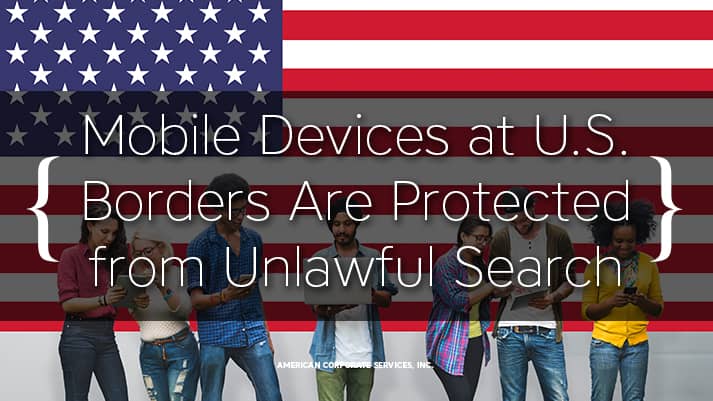The United States District Court for the District of Massachusetts handed down a decision this week that protects persons crossing the border into the United States from unlawful search and seizure of their cell phones and other mobile devices.
First Amendment Rights Violation
United States District Judge Denise J. Casper, ruled that the heretofore limitless search authorization by the U.S. Customs and Border Protection (CBP) and the U.S. Immigration and Customs Enforcement (ICE) agents’ search policies “substantially burden travelers’ First Amendment rights.”
In part, the First Amendment states that
Congress shall make no law . . . abridging the freedom of speech, or of the press; or the right of the people peaceably to assemble.
Manual and Forensic Searches without Cause
The attorneys for the plaintiffs drew upon data published by the CBP for the period including the three years inclusive of 2015 to 2017. That data revealed that
| agents had scanned or searched a total of 8,503 mobile electronic devices during the entire year of 2015. | |
| agents had scanned or searched 14,993 such devices in the first half of 2017 alone, putting them on track to search 30,000 devices at their own discretion. That is, without cause. |
During that time, the agents detained travelers while they conducted manual and/or forensic searches.
During a manual search, an agent interacts with the device as an ordinary user would.
A forensic search requires the use of special software by which an agent may digitally access background content, including “all active files, deleted files, and log-in credentials and keys for cloud accounts.” (Your data is NOT safe in the cloud.)
The point of the searches violates the fundamental rights of freedom of speech and assembly protected by the First Amendment in that agents are conducting those searches to identify what the owner of the device may have said or to whom they may have said it.
Legitimate Cause for Search
The judge’s decision held that the searches have been conducted without a reasonable cause. In other words, an agent must have a probable cause to search the contents of an electronic device. This typically requires issuance of a search warrant.
With this ruling, neither CBP nor ICE agents have the freedom to demand that travelers at U.S. borders surrender their electronic mobile devices. An agent must produce a legitimate cause for suspecting that device contains information that might be used to incriminate its owner.
The ACS Inc. firm strongly advises travelers, especially visitors and immigrants, to contact a qualified Immigration Attorney before arriving at a U.S. border. We can advise you on how to be prepared for border processing and interviews. This issue with cellular devices is an excellent example of one where you must know how to respond during admission to the U.S.
Immigration attorney at ACS Inc. are available to answer your questions about this matter or any other related to immigration issues. Our entire staff at ACS Inc., is prepared to assist you and show you how we can help to make your immigration dream come true.















